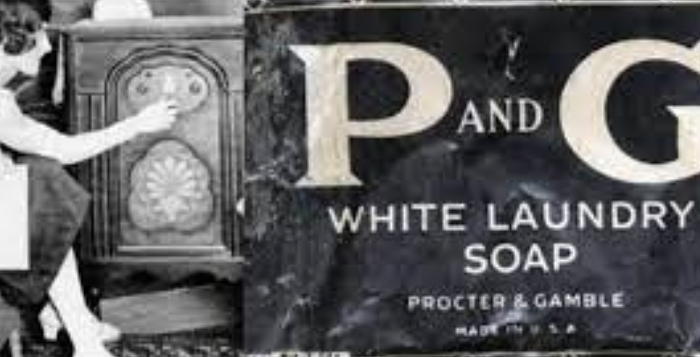
The story of soap opera, from its beginnings on radio through the success of television, is very closely associated with the Procter & Gamble name.
Robert Wehling, a former senior executive who joined the company in the late 1970s, explains the origins of the company’s involvement in the genre.
“We started in radio with what I’d call ‘cooking and recipe shows’ back in the 1920s. In 1923, the company did something called Crisco Cooking Talks on radio where recipes were read. We did various things like that, what I’d call home economics-type of radio shows in the ’20s and into the early ’30s.
“And then in 1930, we decided to start looking at whether or not there was an interest in a radio program that would be more of an entertainment show than an instruction or a help program. And that led to a number of experiments.
“We had a station here in Cincinnati, WLW, that was receptive to those sorts of tests. It led to a show called The Puddle Family. That was in 1932. It was only tested here in Cincinnati and didn’t do well enough to consider going further with it. In 1933, we replaced The Puddle Family with Ma Perkins and that really began our heavy daytime serial involvement.”
The late Robert E. Short, the legendary executive who oversaw much of the company’s success on both radio and television, adds, “Ma Perkins was the first major effort of Procter & Gamble. The show was then in 15-minute form on radio and was sponsored completely by them. That’s how it became ‘Oxydol’s own Ma Perkins.’
“Most of the shows were sponsored by just one brand. There were no other advertisers. The shows were created for the company to advertise the company’s products and they were very successful. Procter & Gamble was the biggest programmer in the field. General Foods and General Mills also had programs of their own. The shows grew out of the creative departments of the advertising agencies. Some of the directors and producers were agency staff people and they just created a production staff.”
“The key guy involved for Procter & Gamble was Bill Ramsey,” notes Wehling. “He shepherded our involvement on all of the radio shows, starting with Ma Perkins and going on through all of the other ones until we moved into television.”
“Bill was a wonderful guy,” enthused Short. “He came to the company around 1930 or so. I don’t know what his initial job was at the company. He was in advertising, but when radio became important and they decided to start the soaps, somebody in management said we have to have somebody in charge of this.
“Why don’t we give it to Bill Ramsey because he has this flair for the creative. So he was put in charge and the thing grew. Bill was always considered to be the artistic one among us and he was quite independent. I admired him a great deal,” he enthused.
“After I finished up at Cornell in 1949,” continued Short, “Bill was the director of radio who hired me. I was lucky enough to get a job with P&G in their radio department. P&G Productions had just been formed and they had two departments: radio, which was the main activity then, and a very embryonic television department. Television was just beginning then. Anyway, P&G had 11 daily 15-minute soaps on the air and I was hired as a supervisor. There were two supervisors at the time.”
Short went on to explain their far reach. “Our programming started at 11:45 a.m. on CBS with Rosemary. Other CBS shows included Ma Perkins, The Guiding Light, The Brighter Day, and Perry Mason.
“Then we switched to NBC at 3:00 p.m. with Life Can Be Beautiful. Then we had Road Of Life, Pepper Young’s Family, and Right to Happiness. We did, by participation, a couple of the [Anne and Frank] Hummert shows. Lorenzo Jones is the only one I remember off-hand. When I went to P&G, The Guiding Light was one of the first shows that I had under my wing. I look at The Guiding Light as kind of my anchor going way back.”
Of course, no producer could have been as successful as P&G without the contributions of talented writers. In the next installment of this series, you will find out more about the writers as well as the advent of television.
Conner Floyd's new fiancé Carly Frei said yes. Read More
Will Ridge find a way to smooth this over? Read More
Holiday highs and corporate lows. Read More
It's the last thing she wants to see. Read More
It was a week filled with drama in Genoa City. Read More
They're more alike than you'd think! Read More